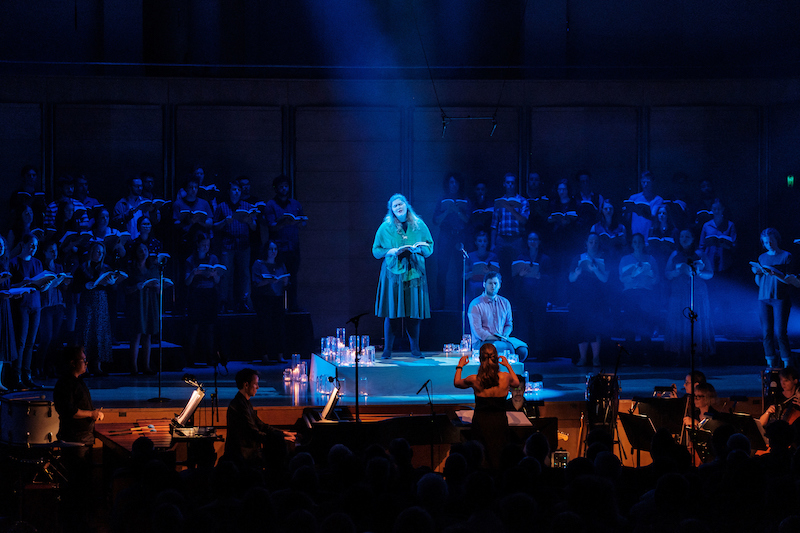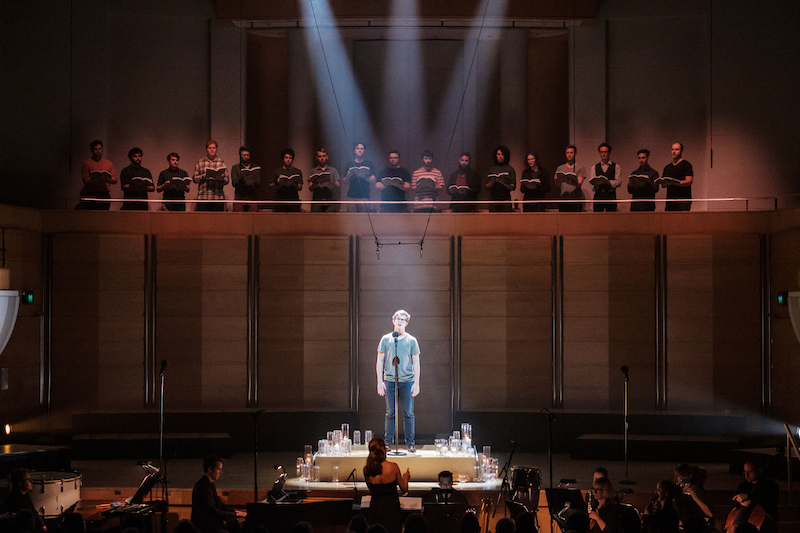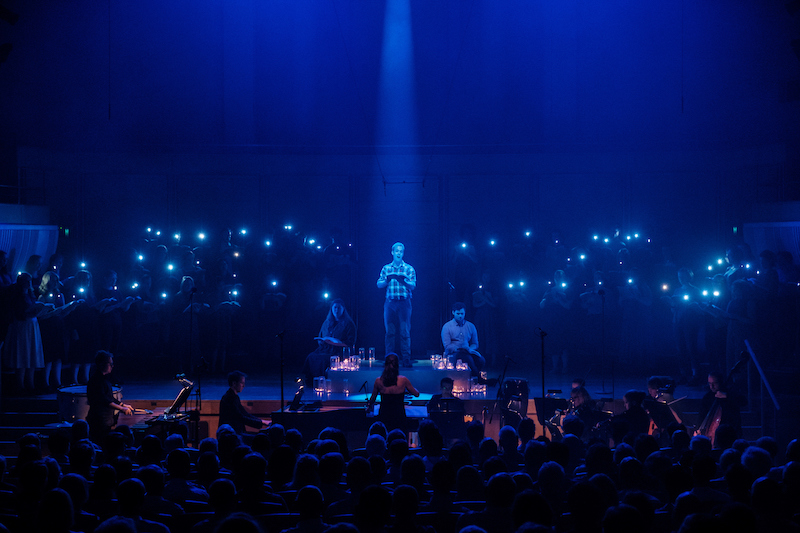Considering Matthew Shepard is a heartfelt choral oratorio by the American composer Craig Hella Johnson. The work premiered in 2016, and this was its Sydney premiere. It was conceived as a memorial for Matthew Shepard, a young gay man who was the victim of a hate killing in Wyoming in 1998. His death led to the passage of a federal US Hate Crimes Prevention Act a decade later.
 Considering Matthew Shepard. All photographs © Robert Catto
Considering Matthew Shepard. All photographs © Robert Catto
Written in the form of the Bach Passions, this is a Passion for a contemporary Saint Matthew (so to speak). The libretto is taken from the writings of several American poets, including two from Wyoming, and deals with Shepard’s cruel and tragic death and its aftermath. Mortally beaten and left to die tied to a fence in the freezing cold, Shepard was subject to a grotesque ‘crucifixion’ (although the two perpetrators were probably too ignorant to see it that way), which makes the Passion setting sadly appropriate. Johnson emphasises the connection to Bach at the outset by quoting Prelude No 1 in C Major (which another composer, Charles Gounod, used as the accompaniment to his Ave Maria). As in the Bach Passions, the choir acts as a Greek chorus making generalised comments about the action, while soloists represent specific people: Matthew, his parents, the county sheriff and so on, as well as the fence. An eight-piece chamber orchestra accompanies, with the piano prominent.
Johnson’s music is suitably solemn, one might say respectful, throughout. His harmonic idiom is tonal, and rhythmically reminiscent of a soft, late 20th-century Broadway style. Occasionally he dips into pop genres – a Country and Western moment, a blues aria – but these are used as colour, rather than a stylistic change of direction. A choir director himself, his choral writing is assured and, I imagine the singers enjoy performing it. At times those textures recall the ethereal beauty of Duruflé’s Requiem, or the gentle harmonic acerbity of Britten’s unaccompanied choral works. One section brings in extra drums, played by members of the choir, representing the spreading of the horrific news following the murder.

Without wishing to criticise Johnson’s achievement, I did find the piece very long (one hour and 45 minutes): the 25-minute epilogue containing one quiet setting after another seemed like a series of false endings. It also took me a while to accept the detached nature of the work. This is a story of extremes: extreme brutality, extreme sadness, extreme anger, but Johnson rarely if ever rises to dramatic heights: it is entirely a work of contemplation. For example, the promise of the extra drums in the section I mentioned above is barely exploited.
Before discussing the performance itself (which was presented by Sydney Philharmonia Choirs and City Recital Hall, as a Mardi Gras Festival Premier Event), it is worth examining the context in which this Australian premiere took place. Shepard’s murder in 1998 had ramifications around the world. It was a primary turning point in the evolution of anti-discrimination legislation. Intelligent people began to understand that the acceptance and legitimisation of homophobic prejudice was always going to be a first step along the road to this end result.
Here in Australia, all of 22 years later, our Federal Government is about to introduce “religious freedom” legislation that will inevitably undermine such progressive thinking. I suspect that it is being done solely for political reasons, as a consolation prize to the voters who were against same-sex marriage. The Government’s position on discrimination, as stated by former Attorney General George Brandis, is that “everyone has the right to be a bigot”. As far as I know, Brandis’s pithy summary has never been officially contradicted but, as George Orwell might say, some rights are evidently more equal than others. The new legislation will create more problems than it solves, especially as there was no real problem that needed solving in the first place. Hopefully, it won’t create a warped justification for a new spate of gay hate attacks. This is the shadow under which Johnson’s Considering Matthew Shepard made its Sydney debut.
The production was simple but highly effective. Spatial variety was brought to an intrinsically static piece by director Shaun Rennie’s sensitive repositioning of the choir at various moments (sometimes on the balcony, sometimes scattered through the aisles), all of which was achieved with quiet dignity. Trent Suidgeest’s subtle lighting complimented Rennie’s direction, and together they created a sensitive and polished setting for the piece. The choir was made up of young members of VOX, part of the Sydney Philharmonia Choirs. All were dressed in everyday clothes (reminding us that, as the libretto stresses, Matthew was an “ordinary boy”), with soloists taken from its ranks.

Inevitably, some soloists were more effective than others. I thought mezzo-soprano Madi Moore hit a perfect balance between legitimate singing and blues in the aria Keep It Away From Me, while baritone Sebastian Lush was also a strong presence. One or two others needed to “sell” the words of their arias and make more detailed points. In short, to communicate. In the generous acoustic of the City Recital Hall, a choir’s words are apt to get lost (although the choral ensemble was excellent), but there is no excuse for a soloist’s words failing to register. This poetry contains consonants as well as vowels!
Conductor Elizabeth Scott clearly had the measure of the piece as a whole, and was impressive in her placing of expressive nuance while balancing the various forces acoustically. Her instrumental ensemble played beautifully, and special kudos should go to pianist Luke Byrne whose sensitivity and reliability anchored Johnson’s musical settings.
This was a unique experience in the Mardi Gras season, balancing all the feathers and frivolity with something deeply moving and thought provoking.











Comments
Log in to join the conversation.